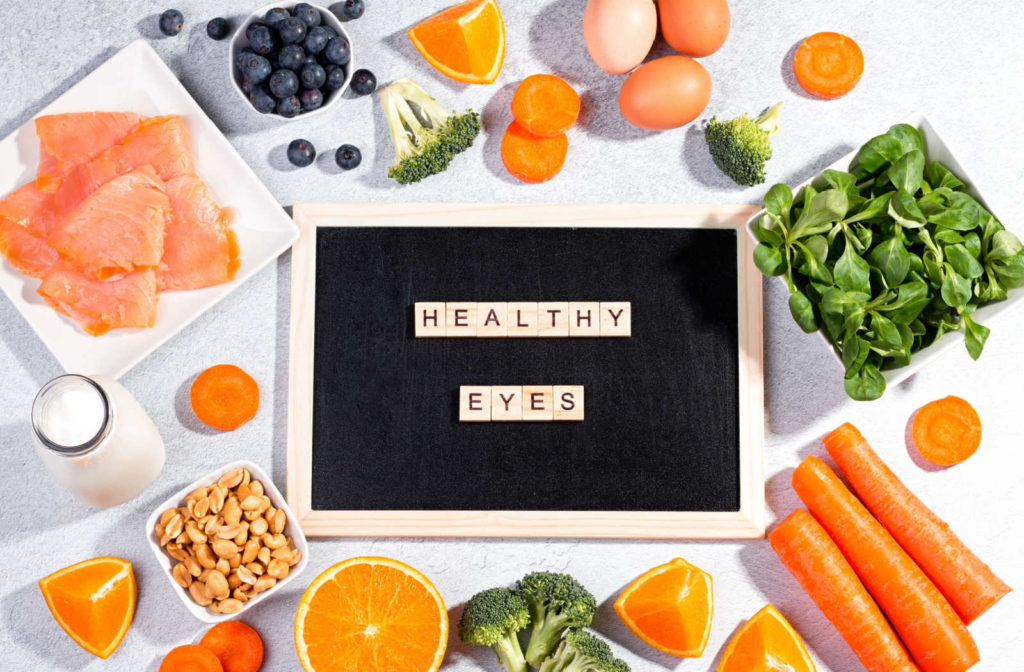Your body is one big interconnected machine, which means the better you take care of your general health, the more you’re able to nurture your eyes. Eating a healthy diet is a big part of keeping your eyes in top shape and preventing vision issues.
While there’s no evidence changing your diet can reverse damage already done to your eyes, a healthy diet of vitamin-rich food may lower your risk of developing eye conditions such as cataracts, glaucoma, or age-related macular degeneration.
If you’re at high risk of eye disease or your optometrist has noticed signs of disease development at your last eye exam, changing your diet could keep your vision healthy. It’s only part of maintaining your eye health, but an easy one once you know the facts.
How Diet Can Affect Your Eyes
The nutrients we take in can affect different parts of our eyes. This is why it’s essential to have an eye health specialist look at your eyes and properly diagnose any problems.
Cornea
The cornea is the clear front part of the eye. It covers the pupil and iris and works with the crystalline lens to bend light toward a layer of photoreactive cells at the back of the eye called the retina. In a healthy eye, a tear film layer protects the cornea and keeps it moisturized.
If you’re one of the 30% of Canadians with dry eye disease, you might be more aware of your cornea than others. Dry eyes can cause irritation, redness, and an insistent scratchiness. It’s a result of you not producing enough tears or producing tears of a low quality.
This condition can result in damage to your cornea if left untreated. Increasing omega-3 fatty acids in your diet may help you find relief by reducing inflammation and increasing tear production.
Macula
At the back of your eye sits the retina. This area is a layer of cells that reacts to light and sends signals to the brain, allowing you to see. At the very center is the macula, which gives you your central vision and helps you see details. When this breaks down, it’s typically referred to as age-related macular degeneration (AMD) and can happen in two ways:
- Dry AMD is the most common type of AMD and occurs when the macula thins as a normal part of the aging process. It progresses slowly over time but can, in some cases, turn into the second type.
- Wet AMD is much more dangerous and can quickly lead to vision loss if not treated. This type is a sudden bleed from underneath the macula and progresses rapidly.
Eye health experts performed two large studies related to AMD called the age-related eye disease studies (AREDS/AREDS2). They found certain combinations of vitamins and minerals lowered the risk of moderate AMD turning into severe AMD. These nutrients are:
- Vitamin C
- Vitamin E
- Copper
- Zinc
- Beta-carotene
- Lutein
- Zeaxanthin
Beta-carotene was part of the first AREDS study of supplements, but in AREDS2, investigators replaced it with the antioxidants lutein and zeaxanthin. The researchers found beta-carotene (the pigment that gives fruits and vegetables their orange colour) might increase the risk of lung cancer in people who smoke.
Retina
People with diabetes tend to have a higher risk of developing conditions that affect the retina, such as diabetic retinopathy. The retina is a key part of our vision. It takes in light and sends that information along the optic nerve to the brain. Therefore, protecting it is vital to protecting our vision.
One way to keep your retina healthy is to avoid vitamin A deficiency, the leading cause of blindness in children worldwide. Your retina uses vitamin A to produce the pigments that help you see correctly. Deficiency typically begins with night blindness but can progress to severe dry eye and ulcers appearing on your cornea.
Which Foods Are Best for Eye Health?
To keep your eyes healthy, you’ll want a variety of antioxidants in your diet. So look for foods high in eye-friendly nutrients such as lutein, zeaxanthin, Vitamins A, C, and E, Beta-carotene, omega-3 fatty acids, and zinc.
Some foods that are rich in these vitamins and minerals include:
- Fish
- Leafy Greens
- Eggs
- Nuts and legumes
- Carrots
- Citrus Fruits
- Sweet potatoes
- Limited milk and yogurt
Preventing Eye Damage
There’s usually little you or your optometrist can do to reverse the damage already done to the eye. It’s always better to prevent damage than try to cure it, and maintaining a healthy diet is a meaningful way to protect your vision health.
By keeping watch on your eye health and uncovering concerns before they become a severe problem, Calgary Optometry Centre can be your partner in keeping your vision safe.
If you’re wondering if there’s more you can do with your diet for your eyes, book an appointment with our knowledgeable team. We’re ready to answer all your questions.




